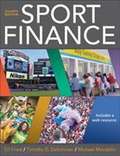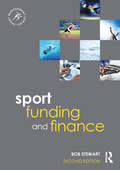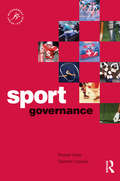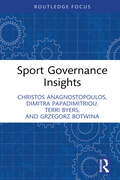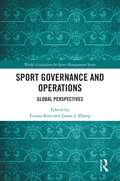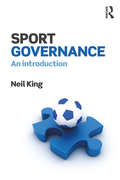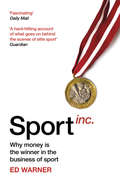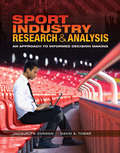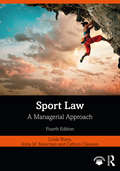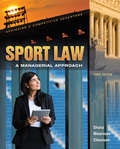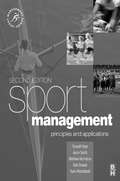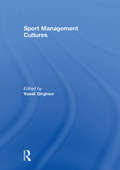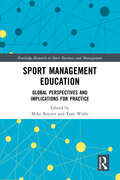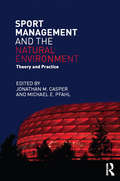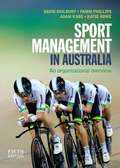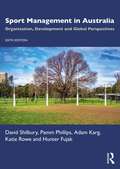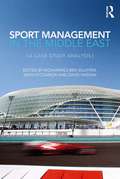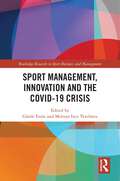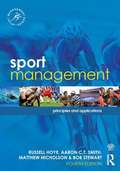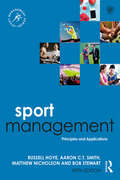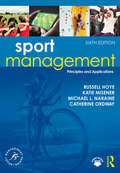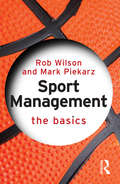- Table View
- List View
Sport Finance
by Michael Mondello Gil Fried Timothy DeSchriverSport Finance, Fourth Edition With Web Resource, grounds students in the real world of financial management in sport, showing them how to apply financial concepts and appreciate the importance of finance in establishing sound sport management practices. Utilizing a modern and practical approach, the text encourages students to take a strategic organizational perspective in learning financial skills while gaining a deeper understanding of the reasoning behind the principles of sport finance. The fourth edition of Sport Finance has been revised and restructured to reflect the evolving needs of students entering the dynamic sport industry. Content updates and additions include the following: A new chapter dedicated to assets (such as players, facilities, and goodwill) and liabilities (such as player salaries and long-term debt) and how they affect a sport organization Expanded coverage of strategies to increase revenue and reduce expenses for greater profitability, enhanced with an example from a real-world athletic department New chapters about reviewing financial statements, planning, and building a financial strategy to help guide decisions to create, expand, or exit a sport business or organization Five new case studies covering a variety of sectors, sports, and countries to give students the opportunity to apply the concepts to practical scenarios To further relate the content to real situations for students, study questions about each of the case studies have been incorporated into a new student web resource. The web resource also includes an interactive simulation called “The Two Dollar Team” that directly engages students with the book’s topics, including assets and liabilities, revenue and expenses, budgeting, cash management, and borrowing. Instructors will also find additional activities and a case study in the companion instructor guide, and they will receive a test package and presentation package. Sport Finance, Fourth Edition, will enable students to grasp fundamental concepts in sport finance. By analyzing business structures, financial statements, and funding options, students will not only learn basic finance but will also understand how those skills are used to build a strategy and make sound financial decisions in the world of sport.
Sport Funding and Finance: Second edition (Sport Management Series)
by Bob StewartSport Funding and Finance provides a complete introduction to the macro-level and micro-level aspects of sport finance. It describes the evolution of sport from a kitchen-table operation into the sophisticated, boardroom-driven global financial industry that it is today. It uses the professional sports leagues of the US and Europe as an international benchmark, and explains why the financial context is so important for all managers working in sport. The book also provides a step-by-step introduction to the principles and practice of effective financial management, providing the reader with a complete set of professional tools and skills for use in the sport industry. Now in a fully revised and updated new edition, the book develops the reader’s understanding by first explaining basic concepts in finance and accounting before progressing to more complex issues and ideas. It covers every key topic in financial management, including: Planning and strategy Budgeting Financial projections Fundraising Pricing Costing Feasibility studies Economic impact analysis Ratio analysis Every chapter includes a blend of theory, contextual material and real-world data and case studies from around the world, clearly linking principles to practice, as well as review questions and problem-solving exercises to test the reader’s understanding. Sport Funding and Finance is the perfect foundation text for any degree-level course in sport finance, and an invaluable reference for any sport management professional looking to deepen their understanding of funding and finance.
Sport Governance (Sport Management Ser.)
by Russell Hoye Graham CuskellySport Governance provides a comprehensive guide to the practical application of governance principles to amateur and professional sport organisations operating at the community, state/provincial, national, and international levels. It presents a balanced view between accepted practice and what contemporary research evidence tells us about a range of governance principles and practices. Organised in three parts, the text provides the reader with* an explanation of the concept of governance, key terms and definitions as well as the economic, political and social factors that impact on how the governance function is enacted within sport organisations;* an understanding of the “mechanics” of governance – the elements of structure, process and performance that ensure the governance function is carried out within sport organisations; and* a discussion of a number of contextual issues in sport governance, including dual leadership, ethics, governance change and future governance challenges.Sport Governance is essential reading for practitioners working and volunteering in the sport industry and upper level undergraduate and postgraduate students enrolled in sport and leisure management programs.
Sport Governance Insights (Sport Business Insights)
by Terri Byers Christos Anagnostopoulos Dimitra Papadimitriou Grzegorz BotwinaThis book introduces the fundamentals of sport governance, assuming no prior knowledge on the part of the reader. It explains to students and practitioners alike why governance matters and how it can be better practiced in sport organizations. Introducing key concepts and the micro-processes of implementation, the book explains what governance is and why it has become increasingly important. It explains what sport boards do, and how they should function for sport organizations to be effective, and it provides practical tools to help ensure good governance. Full of insights from cutting-edge research and real-world cases, this is essential reading for any student or practicing sport manager, administrator, or policy-maker who needs a concise introduction to this important topic.
Sport Governance and Operations: Global Perspectives (World Association for Sport Management Series)
by James J. Zhang Euisoo KimGovernance is at the centre of the work of all sport organizations, from small sport clubs to international sport federations. This book explores sport governance in today’s globalised marketplace. It adopts a broad, modern definition of ‘governance’ that includes the operational process of organizing resources and the implementation of standing policies and plans, as well as regulation, direction, control and evaluation. The book presents a series of cutting-edge case studies that shine important new light on key themes in contemporary sport management, including sustainability, human resource management, cross-cultural management and labour markets, across a wide range of sporting contexts, from Formula One and the Commonwealth Games to the NCAA. Bringing together researchers and practitioners from five continents, it represents an important platform for the international exchange of ideas, best practices, and scholarly enquiry. This is fascinating reading for any student, researcher or practitioner with an interest in sport business and management, event management or international business.
Sport Governance: An introduction
by Neil KingSport governance has become an increasingly widespread subject for research and teaching in sports studies. This engaging and accessible textbook examines the governance of sport organisations in a changing political, legal, financial and socio-cultural context. It explains how sport organisations are governed, explores the issues and challenges faced by those governing sport today, and looks ahead to how sport can be governed better in the future. Covering sport at all levels, from community organisations and national governing bodies to international organisations such as the IOC and FIFA, this text examines key components of governance, such as legal and regulatory frameworks, stakeholding, performance, compliance and the reform of the non-profit sector in line with corporate governance. This text is also timely given that recent corruption scandals in sport have served to highlight the central importance of good governance in sport. Its nine chapters draw upon more than thirty international case examples across a range of sports including athletics, football, gymnastics, hockey, rowing, rugby, badminton and tennis. With extensive lists of learning activities and resources, original empirical research and insights into the politics of policymaking and implementation, this textbook is essential reading for any course on sport governance, policy, management or development.
Sport Inc.: Why money is the winner in the business of sport
by Ed WarnerWhy would someone pull the plug on a Premier League match? What prompts an athlete to search for sponsorship on eBay?How can the decision of a drinks brand CEO make or break an entire sport?Why would a sprinter think they can’t afford not to dope?Sport Inc. reveals the behind-the-scenes finances that drive sport - who gets rich and who gets left on the bench.Through investigations into a wide range of sports, including how football agents really work, the betting industry and corruption, esports, the NFL’s efforts to take over the world and the real cost of hosting events like the World Cup and the Olympics, the financial realities of our obsession with sport are exposed.As spectators our choices make us key players in this game of riches – it’s time to find out who’s winning and who’s losing.
Sport Industry Research and Analysis: An Approach to Informed Decision Making
by Jacquelyn Cuneen David TobarSport Industry Research & Analysis offers a no-nonsense, straightforward approach to the study of research design and statistical analysis in the sport enterprise. Each chapter outlines real-world instances in which research and statistics contribute to bottom-line decisions. The book includes clear, progressive instructions, using spreadsheets for statistical computations and analyses. The explanations for the calculations and analyses are presented in the context of sport industry scenarios with sample data. Additional scenarios with sample data provide hands-on practice with each statistical test. "In Practice" contributions from sport industry professionals demonstrate how these practitioners use research and statistical analysis in their everyday tasks. This book's succinct, applied approach to research design and statistical analyses provides readers with essential skills to help them understand the importance of an information-based approach to decision making in the sport enterprise.
Sport Industry Research and Analysis: An Informed Approach to Decision Making
by Jacquelyn Cuneen David A. TobarSport Industry Research and Analysis offers a straightforward, no nonsense approach to research design and statistical analyses in sport organizations. This fully revised and updated new edition describes the research process, from identifying a research question to analyzing data, and uses real world scenarios to help students and industry professionals understand how to conduct research and apply the results in their wider work. The book includes clear, step-by-step instructions for the analysis and interpretation of data. It explains how to use Excel and SPSS for every key statistic and statistical technique, with screenshots illustrating every step and additional scenarios providing further context. "In Practice" contributions from sport industry professionals demonstrate how these practitioners use statistical analyses in their everyday tasks, and this new edition includes expanded sections on conducting a literature review and research ethics, as well as ancillary materials for instructors including slides, test questions, data files, answer sheets, and videos. This is the clearest and most easy-to-use guide to research and analysis techniques in sport, helping the reader to build essential skills and confidence in using statistics, vital to support decision-making in any sport enterprise. It is an essential text for any sport business research methods course, and an invaluable reference for all sport industry professionals.
Sport Law: A Managerial Approach
by Anita M. Moorman Cathryn Claussen Linda SharpNow in its fourth edition, this text is still the only sport law textbook to introduce sport legal studies from a management perspective and integrate legal strategies to gain a competitive advantage in business. Acknowledging that students understand legal concepts better when they are tied to real sport management practice, the book is organized around the core management functions. It provides concise explanations of key concepts, as well as current industry examples and legal cases, and gives the student all the legal knowledge they need to become confident and effective professionals in sport management, recreation, or sport education. This new edition includes additional contributions from leading sport law educators and practitioners, and has expanded coverage of important contemporary issues including: · Sports injury and concussion litigation· Impact of Covid-19 on events and leagues· Gender discrimination, disability discrimination, sexual harassment, #metoo, and USWNT pay equity· Intellectual property, licensing agreements, publicity rights, social media influencers, and digital privacy· Student-athletes and marketing rights· Sport gambling and state regulation· Athlete activism, employee free speech, and collective bargaining· Olympic and Paralympic restructuring· NCAA Division 1 Coaches Contracts The book contains useful features and ancillaries to help with teaching and learning, including managerial context tables, case opinions, focus cases, strategies for competitive advantage, discussion questions, and learning activities. It is an essential text for any course on sport law or recreation law, an invaluable supplement to any course on sport business and management, and an important reference for all sport management practitioners. Online resources include a variety of exam questions for each chapter, featuring multiple choice, true or false, short answer exam questions and short essay questions, and a sample syllabus.
Sport Law: A Managerial Approach
by Anita Moorman Cathryn Claussen Linda SharpSport Law: A Managerial Approach, third edition, merges law and sport management in a way that is accessible and straightforward. Its organization continues to revolve around management functions rather than legal theory. Concise explanations, coupled with relevant industry examples and cases, give readers just enough legal doctrine to understand the important concepts that apply to each area. This book will help prepare students as they get ready to assume a broad range of responsibilities in sport, education, or recreation. Whether readers work as coaches or teachers; administer professional programs; manage fitness/health clubs; or assume roles in a high school, college, Olympic, or professional sport organization, legal concerns will inevitably be woven into their managerial concerns. This book provides knowledge of the law that helps create a competitive advantage and build a more efficient and successful operation that better serves the needs of its constituents. New to the Third Edition New/expanded discussions and analysis of current and relevant legal issues. For example, the use of unpaid interns and unpaid volunteers; Bountygate, organizational liability for violent acts of players, and the power of the NFL commissioner; parody and social media; FTC guidelines for endorsers New case opinions. For example, Bouchat v. Baltimore Ravens; Glatt v. Fox Searchlight Pictures New focus cases. For example, Hart v. Electronic Arts, Inc., Hamill v. Cheley Colorado Camps, Inc., Geczi v. Lifetime Fitness, Limones v. School Dist. of Lee County; Woodman v. Kera LLC New competitive advantage strategies. For example, construction safety; ticket sales; worker’s compensation and student-athletes Discussion of the legal issues revolving around social media use. For example, Mendenhall v. Hanesbrands and the use of Twitter by professional athletes; IOC guidelines regarding the use of social media by athletes and journalists; social media policies at the high school and collegiate levels Real-world applications. The book is intended for future sport managers, and topics are clearly related to specific roles and functions; relevant and timely examples throughout help generate enthusiasm and lively class discussions. Continued focus on both sport participation and recreation. Sport managers in a variety of organizations can use the legal issues discussed throughout. Reader-friendly tone. Legal theories are clearly explained in student-friendly language. Special Features of the Book Managerial context tables. Chapter-opening exhibits act as organizational and study tools identifying managerial contexts in relation to major legal issues, relevant law, and illustrative cases for the chapter. Case opinions, focus cases, and hypothetical cases. Legal opinions--both excerpted (case opinions) and summarized (focus cases)--illustrate relevant legal points and help readers understand the interplay between fact and legal theory. The cases include questions for discussion, and the instructor’s manual provides guidance for the discussion. Hypothetical cases further highlight topics of interest and include discussion questions to facilitate understanding of the material; analysis and possible responses appear at the end of the chapter. Competitive advantage strategies. Highlighted, focused strategies based on discussions in the text help readers understand how to use the law to make sound operational decisions and will assist them in working effectively with legal counsel. Discussion questions, learning activities, and case studies. Thoughtful and thought-provoking questions and activities emphasize important concepts;they help instructors teach and readers review the material. Creative case studies stimulate readers, as future sport or recreation managers, to analyze situations involving a legal issue presented in the chapter. Annotated websites. Each chapter includes a collection of web resources to help readers explore topics further. Accompanying the web addresses are brief descriptions pointing out key links and the sites'...
Sport Management
by Bob Stewart Aaron Smith Matthew Nicholson Russell Hoye Hans WesterbeekSport Management: principles and applications second edition provides a comprehensive introduction to the practical application of management principles within sport organisations. Ideal for all students studying sport management at an introductory level, it presents an international balanced view between accepted practice and what research evidence tells us about the application of a range of management principles and practices in sport. Structured in two parts it offers an introduction and explanation of the structure of the sport industry and covers the fundamental management issues unique to sport including: strategy, human resource management, leadership, finance, marketing, governance and performance management. Each chapter has a coherent learning structure complete with international case studies and accompanying online lecturer and student support material which: presents a conceptual overview of the focus for the chapter presents accepted practice supported by specific organisational examples at the community, state/provincial, national and professional level, these organisations will include examples specifically from the UK, Australia and New Zealand presents one big case for analysis per chapter, which is supported by online diagnostics and tutor resource materials presents research findings from around the globe presents a summary of guiding principles for the focus of the chapter based on a balanced view of practice and research presents a section of teaching and learning resources including a review questions, further reading, relevant websites provides online access to PowerPoints per chapter, tutorial activities per chapter and test bank of multiple choice questions for students per chapter This book combines clearly explained theory with a variety of pedagogical features that make it essential for students and teachers of sport management.
Sport Management Cultures
by Vassil GirginovThis is the first book to address the link between culture and sport management. The aim is to demonstrate that culture profoundly affects how we research, teach and practice sport management. The book engages with the concept of culture both as an abstract analytical category and specific beliefs and practices. It recognizes that a single best way of managing does not exist; that the applicability of management theories may stop at national boundaries; and that fundamental cultural values act as a strong determinant to managerial ideology and practice. Culture makes the study of sport management interesting because it challenges many taken-for-granted assumptions about management, yet it reinforces our belief in the existence of common management problems. The book offers a comprehensive review of the conceptualisations of culture and its relation with sport management by examining a range of issues: the emergence of multiculturalism as a policy issue; the impact of commonly shared cultural values within the fitness industry on managers and organisations behaviour; building cultural bridges in community sport organisations; cultural meanings attached to the consumption of Olympic merchandise, and culturally-informed interpretation through a reflective analysis of sport management texts. This book was published as a special issue of European Sport Management Quarterly.
Sport Management Education: Global Perspectives and Implications for Practice (Routledge Research in Sport Business and Management)
by Mike RaynerThis book examines a range of contemporary issues related to the global delivery of sport management education. At a time of unprecedented change in Higher Education, the book looks closely at how sport management education can and should deliver positive outcomes in sport business and management outside of the university. The book brings together sport management academics from around the globe and examines how their practice in education has been shaped by the cultural, religious, and political context of the national regions in which they work. It aims to identify core principles in sport management education and implementation, and discusses the key aspects of sport management programmes, from curriculum design and pedagogy to issues around unified accreditation and the needs of employers. It also focuses in on what sport management education might look like in an increasingly digital post-COVID world. This is essential reading for all sport management educators and anybody working in sport-related professions looking to understand global educational platforms and their implications for policy at local, regional, national, and international level.
Sport Management and the Natural Environment: Theory and Practice
by Jonathan M. Casper Michael E. PfahlWith climate change and other environmental issues becoming increasingly prominent, any successful sport organization now has to incorporate environmental concerns into their business strategy, while all sport managers must understand how to implement environmental initiatives into their everyday business. Sport Management and the Natural Environment is the first book to introduce environmental theory and best practice in the context of sport management, demonstrating how sport organizations can become more effective and sustainable, and exploring the important advocacy role that sport organizations have in local and global communities. It considers the unique social, economic and political space that sport occupies in society, and examines the most important practical managerial issues related to sport and the environment, including: Facilities Finance and accounting Leadership Marketing, communication and digital media Operations Stakeholder relations Strategic planning Including contributions from leading academics and practitioners, Sport Management and the Natural Environment is the perfect foundation text for any course touching on environmental issues or social responsibility in sport, and essential reading for any sport manager looking to improve their professional practice.
Sport Management in Australia: An organisational overview
by Pamm Phillips David Shilbury Adam Karg Kathryn RoweSport is one of Australia's major industries, as well as one of our most popular pastimes. From council playing fields to Olympic competition, sport is highly organised and structured.Sport Management in Australia provides a comprehensive overview of the organisation of sport in Australia. It outlines trends in participation, the role of government and private organisations, different models of delivering sporting services, and the benefits and drawbacks of increasing commercialisation. Fully revised and updated, this fifth edition includes coverage of a wider range of sporting events, deeper coverage of corporate sport organisations, and new material on both mass participation in sport and elite sport, and also on the contribution sport makes to society.Drawing on examples and comparisons from countries around the world, and with extended case studies, Sport Management in Australia is the indispensable starting point for anyone embarking on a career in sport management.
Sport Management in Australia: Organisation, Development and Global Perspectives
by Pamm Phillips David Shilbury Katie Rowe Adam Karg Hunter FujakThis is the only book to introduce the history, organisation, management and development of sport in Australia. Now in a fully revised and updated sixth edition, it is the perfect foundation text for anybody looking to understand the policies, processes and practices that help maintain Australia’s position as a powerhouse of global sport. This book outlines trends in participation, the role of government and private organisations, different models of delivering sporting services and the benefits and drawbacks of increasing commercialisation. Covering sport at all levels, from community sport to elite level, including mega-events such as the Olympics and Commonwealth Games, this sixth edition includes three brand-new chapters, looking at the sport workforce, innovative delivery models and sustainable sport. This book also considers the Australian system in a global context, drawing comparisons with other sporting systems around the world. Every chapter offers useful features, such as review questions, case studies and practical examples. Sport Management in Australia is an essential text for any sport management, sport policy or sport development course. This book is accompanied by PowerPoint slides and exam questions for each chapter.
Sport Management in the Ibero-American World: Product and Service Innovations (World Association for Sport Management Series)
by James J. Zhang Jerónimo García-Fernández Gabriel Cepeda CarriónThis book explores innovation in technology, products, and services in sport management in the Ibero-American region, one of the most rapidly developing regions in world sport. This timely volume captures a sense of the potential impact and opportunities presented in the region for international sport businesses and sporting organisations. The book presents cutting-edge research into topics as diverse as digitization in the Chilean sport industry; responses to COVID-19 by sports clubs in the region; consumer behavior in the Portuguese fitness industry; multiplatform content distribution in Brazilian basketball, and the strategy behind the growth and development of the Valencia marathon in Spain. It is full of insight, data, and examples of best practice in innovation. This is fascinating reading for any student, researcher, or practitioner working in sport management, sport business, sport governance, international business and management, or Ibero-American studies.
Sport Management in the Middle East: A Case Study Analysis
by Sean O'Connor David Hassan Mohammed Ben SulayemThe Middle East is one of the fastest growing and significant markets in world sport, as well as a powerful source of investment in sport. Bids for the Olympics in 2020 and the soccer World Cup in 2022, as well as remarkable investments in Formula One motor racing, horse racing and English Premier League soccer clubs, demonstrate the strength of interest, the depth of resource and the technical expertise maintained by sport business interests in the region. Sport Management in the Middle East is the first book to offer a serious and in-depth analysis of the business and management of sport in the region. Written by a team of world leading researchers in Middle Eastern sport, and illustrated in full colour throughout, the book examines the importance of sport in the Middle East and introduces its particular management processes, structures and cultures. As well as providing an overview of the region’s sporting strategy and key stakeholders, the book also offers a number of detailed case-studies of sport in individual Middle Eastern countries. A unique guide to sport management in a region of fundamental importance in world sport, this book is essential reading for any serious student or scholar of sport management, sport business, Middle East studies, or sport and society.
Sport Management, Innovation and the COVID-19 Crisis (Routledge Research in Sport Business and Management)
by Meltem Ince Yenilmez Gözde ErsözThis book looks at how sport and sports organisations have had to innovate during the COVID-19 pandemic. Against a backdrop of lockdowns, empty stadia and a fast-moving public health crisis, the book presents fascinating case studies of innovation and crisis management in sport, with valuable lessons to be learned for preparedness and resilience in future crises. The book explores how managerial processes have evolved during the pandemic in areas as diverse as sports communication, youth sport, sports events, esports, sports tourism, and physical activity, in both professional and community settings. It considers the fundamental importance of technology as a tool of innovation, and considers how different stakeholder groups, from governing bodies to athletes to fans, have developed new pathways of engagement and what that might mean for the future development of the sport industry. This book is fascinating reading for any student, researcher, practitioner or policy maker looking to better understand this profound moment in the history of sport and society, and to anybody with an interest in key themes in sport business and management, such as innovation, crisis management or consumer behaviour.
Sport Management: Principles and Applications
by Bob Stewart Matthew Nicholson Russell Hoye Aaron C.T. SmithNow available in a fully revised and updated fourth edition, Sport Management: Principles and Applications introduces the sport industry and examines the role of the state, non-profit and professional sectors in sport. It focuses on core management principles and their application in a sporting context, highlighting the unique challenges faced in a career in sport management. Written in an engaging and accessible style, each chapter has a clear structure designed to make key information and concepts simple to find and to utilize. Chapters contain a conceptual overview, references, further reading, links to important websites, study questions and up-to-date case studies from around the world to show how theory works in the real world, and a companion website offers additional activities for students and guidance notes and slides for instructors. The book covers every core functional area of management, including: strategic planning organizational culture organizational structures human resource management leadership governance financial management marketing performance management. This fourth edition also includes expanded coverage of sport media, change management and other contemporary management issues, providing a comprehensive introduction to the practical application of management principles within sport organizations. It is ideal for first and second year students on sport management related courses, as well as those studying business-focused or human movement courses seeking an overview of applied sport management principles.
Sport Management: Principles and Applications (Sport Management Series)
by Bob Stewart Matthew Nicholson Russell Hoye Aaron C.T. SmithNow available in a fully revised and updated fifth edition, Sport Management: Principles and Applications tells you everything you need to know about the contemporary sport industry. Covering both the professional and nonprofit sectors, and with more international material than any other introductory sport management textbook, it focuses on core management principles and their application in a sporting context, highlighting the unique challenges of a career in sport management. The book contains useful features throughout, including conceptual overviews, guides to further reading, links to important websites, study questions, and up-to-date case studies showing how theory works in the real world. It covers every core functional area of management, including: Strategic planning Financial management Organizational culture and design Human resource management Leadership and governance Marketing and sponsorship Performance management Sport and the media. The fifth edition includes expanded coverage of sport for development, analytics, monitoring and evaluation, ethics, risk management, sport and health, social media, sustainability, and other contemporary management issues. Complemented by a companion website offering additional resources for students and instructors, this is an ideal textbook for first and second year students in sport management degree programs and for business students seeking an overview of applied sport management principles.
Sport Management: Principles and Applications (Sport Management Series)
by Russell Hoye Katie Misener Catherine Ordway Michael L. NaraineNow available in a fully revised and updated sixth edition, Sport Management: Principles and Applications tells you everything you need to know about the contemporary sport industry. Covering both the professional and nonprofit sectors, and with more international material than any other introductory sport management textbook, it focuses on core management principles and their application in a sporting context, highlighting the unique challenges of a career in sport management. The book contains useful features throughout, including conceptual overviews, guides to further reading, links to important websites, study questions, and up-to-date case studies showing how theory works in the real world. It covers every core area of management, including: Strategic planning Human resource management Leadership and governance Marketing and sponsorship Sport and the media Sport policy Sport law The sixth edition includes expanded coverage of key contemporary issues, including integrity and corruption, digital business and technology, and legal issues and risk management. With useful ancillary material for instructors, including slides and case diagnostic exercises, this is an ideal textbook for first- and second-year students in sport management degree programs and for business students seeking an overview of applied sport management principles.
Sport Management: The Basics (The Basics)
by Rob Wilson Mark PiekarzSport Management: The Basics is an engaging and accessible introduction to sport management which considers a range of contemporary philosophical, social, cultural and political matters as they impact on this growing field. Drawing links between academic theory and practice, it explores the current challenges facing managers in the sport industry, addressing topics including: the history of sport management the role of the manager levels of management the public, private and voluntary sectors sport management in the global marketplace With suggestions for further reading throughout the text, a comprehensive chapter on employment and employability, and case studies which explore both theory and practice, Sport Management: The Basics offers a clear and concise introduction for anyone seeking to study or work in sport management.
